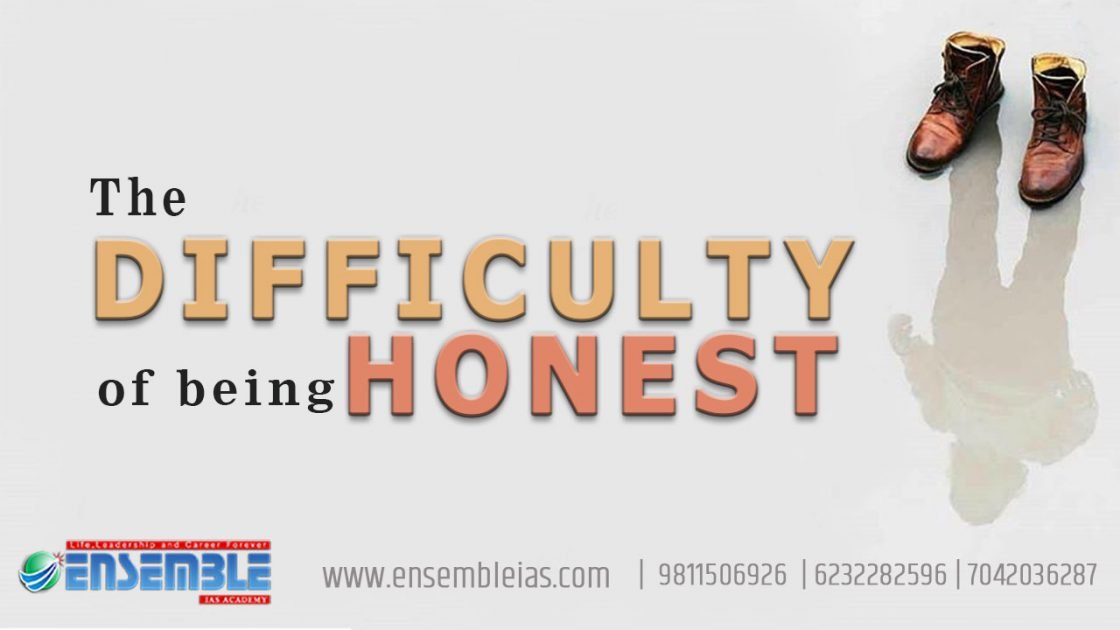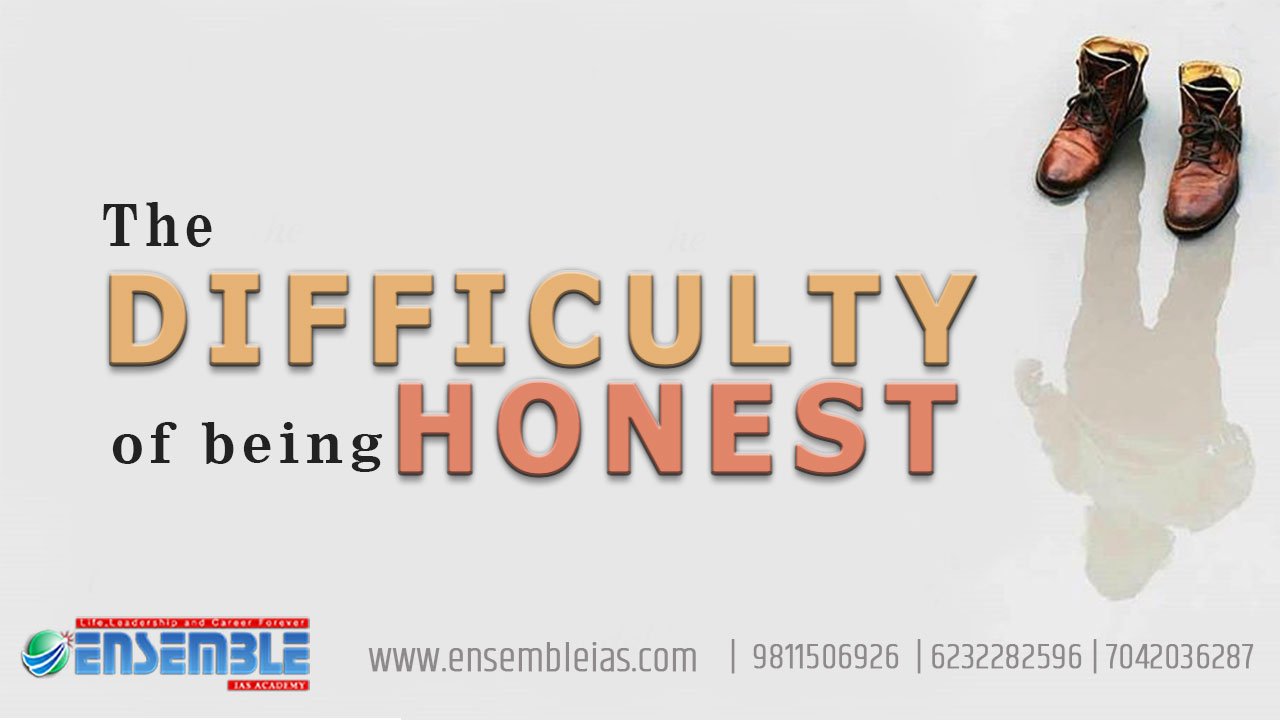 The honest go on, driven an inner force that borders on recklessness. A society that creates hurdles to exhaust the honest or wound them, paves the path for its own perditions.
The honest go on, driven an inner force that borders on recklessness. A society that creates hurdles to exhaust the honest or wound them, paves the path for its own perditions.
“Honesty is the best policy” was a favourite topic of debates in school. It is another matter that both sides — for and against — ended up supporting the motion; the only point of difference being whether honest was its own reward or it came with an avoidable cost.
Visit our store at http://online.ensemble.net.in
One could wonder at the wisdom in this dictum. A policy by definition is something that is adopted after weighing the pros and cons of various alternatives. It is defined as “a way of behaving that you think is best in a particular situation”, or as “prudent or expedient conduct or action”. In either case, it is a well-considered approach, not merely the ingrained response of an individual based on inherent values.
Is honesty to be understood as a pragmatic way of dealing with situations or is it simply an ethical response to any given situation influenced by an individual’s character? When an individual is faced with a dilemma of making a choice, he either responds instinctively or makes a well-reasoned decision.
For instance, an auto driver finding a passenger’s purse in his vehicle, may decide to look for the passenger, deposit the purse in a police station, or report the matter to his owner. As long as he doesn’t keep the money with him, he may have acted honestly. His honest act may or may not be rewarded, but he has chosen to exchange the pleasure of pocketing the money with the comfort of his conscience.
That, however, is a simplistic example. Honesty as a policy always comes with a price. It demands a premium like an insurance policy, although it might appear not to command a premium or provide any insurance. The path of honesty, like dharma, is straight yet seldom simple. It often turns out to be tortuous, consumes more energy, sometimes even damaging the vehicle because of unfavourable road conditions. The honest, however, go on regardless, perhaps driven by an inner force that borders on recklessness. A society that creates hurdles which exhaust the honest or wound them paves the path for its own perdition.
“Honesty is the best policy”
At the same time, should honesty be an obsession? Should it drive itself so hard that nothing survives save itself? No system would benefit by such a compulsive pursuit of a sacrosanct principle that believes in preserving itself regardless of the outcome of the task at hand. No system can be productive if it is obsessed with defining the idea of honesty narrowly and subjecting everyone to a hidebound, arbitrary ideal. The outcome of such a narrow approach would be a society of persons with their chastity belts seemingly intact but with little else to show.
The honest, one could say, are those who are honest to their job and achieve the desired result by adopting honest means, being neither unduly swayed by the pressure to perform at all costs nor weighed down by passive principles that shackle performance. For example, in the case of a civil servant, accommodating popular expectations is not necessarily an act of dishonesty; succumbing to the pressure of the present is.
View our Blog: https://ensembleias.com/blog/
If a public servant decides to accommodate the genuine concerns of an individual without compromising public interest, it cannot be termed a dishonest act. Interventions to resolve such individual difficulties cannot be treated as favours to individuals.
Discretion at senior level becomes necessary because sometimes people find it impossible to wade through the mire of regulations and deal with the cussedness of the system that disregards the peculiarities of an individual situation. Obsession with the appearance of non-discretionary application of rules would create an army of inert bureaucrats who would delight more in the preservation of rules than finding solutions to problems.
The Prevention of Corruption Act is meant to be a deterrent against exercising judgement with malafide intent; if it throttles individual initiative taken in right earnest, bureaucrats would be more servants and less civil. Civil servants have to solve problems without being shackled by the fear that their discretion in resolving a difficulty could be regarded as acts of undue benevolence. If their ability to resolve problems is curbed by such a shining armour around them, civil servants may end up as an unscathed army of defeated warriors.
The essential characteristic of an honest person is that he or she is truthful. His action is based on an inner voice that guides him to make a distinction between what is right and what is wrong, generally influenced by the prevailing law, his moorings and morality. There is seldom a conscious risk analysis of consequences. Therein lies the difficulty of being good. Some would call it foolhardiness, bravado or tactlessness; tact being the “kavach” of successful civil servants.
There is a price for honesty as for everything else in life. Being prepared to pay that price, directly or by way of collateral damage, is part of the honest act. The price depends on who bears the brunt of honest action. The sermon is that honesty is its own reward and it is recognised in the long run. In the real world, “the long run” could be unpredictably long.
A quiet and prolonged grind could follow the fleeting drone of feeble praise. It is naïve to expect those that have been opposed by the honest to meekly accept the ascendance of the meek. They strike back and the price for the honest could be in the form of lonely suffering, even noticeable isolation. The honest could be shunned by friends and foe alike. It is an interesting interplay between those who dread the fearlessness of the honest and those that fear the generally dreaded.
It would be mawkish to think that those who do not stand by the honest are dishonest. People are generally good; they are also generally timid. Fear cannot always be associated with evil, just as fearlessness cannot be always associated with good. The absence of fear gives courage. Without courage honesty is a pathetic virtue.
The honest may not be physically strong or powerful; they have courage and that courage is their strength. Those that do not stand by them in that hour of grief, need or isolation, might not be courageous. They are like spectators who rise to applaud after the drama. Even if they empathise with the actor, they don’t take part in the play.
They may watch the protagonist suffer, even shed a tear at his plight, offer a silent prayer in his favour and wait for the denouement before they laud his part. They are either happy at the outcome or rue the tragedy. After all, what is drama if there are no silent spectators? They face the dilemma of “to be or not to be”.
As far as the protagonist is concerned, however lowly or mighty he might be, he is convinced that his honest deed, whether instinctive or a conditioned response of his character, is the best policy after all.
Source: Indian Express|Written by Ashok Lavasa
#honesty #policy #difficulty #current_affairs #daily_updates #editorial #geographyoptional #upsc2020 #ias #k_siddharthasir #ensembleiasacademy




